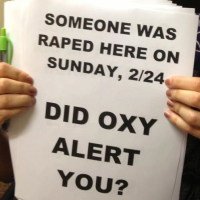Allegation that Occidental College Failed to Report Sex Assaults Was Wrong

With two federal investigations swirling about them in October, Occidental College in Los Angeles came clean about the alleged student sexual assaults that it had failed to report to the U.S. Department of Education, as required by law—all 24 of them in 2010 and 2011.
The Los Angeles Times reported December 7 that college officials left some out. After looking through “two confidential federal complaints against the school” and other documents, the newspaper said the school should also have copped to 27 more unreported alleged assaults in 2012. School officials and faculty told the Times that Dean of Students Barbara Avery told them there were 34 assaults that year. The school only reported seven.
The Times was in error and admitted as much on March 14, 2014. The reporter, Jason Felch, incorrectly reported the 27 incidents were sexual assaults, as defined by the federal Jeanne Clery Act.
They were not.
A subsequent review by the Times, after demands from Occidental for a correction, revealed that some of the incidents “involved sexual harassment, inappropriate text messages or other conduct not covered by the act. Other alleged incidents were not reported because they occurred off-campus, beyond the boundaries that Occidental determined were covered by the act. Some occurred in 2011, and the college accounted for them that year.”
Although those 27 incidents were bogus, Occidental also might have mentioned dozens more allegations that it failed to report because they came from anonymous sources. The online complaints were gathered by the school since 2009 on a system developed to encourage students to report assaults. The Times said meeting minutes show that Avery told faculty members that she was unaware anonymous allegations had to be reported, but critics say they were purposely tossed for appearances’ sake.
Occidental is under investigation for violations of the federal Jeanne Cleary Act and Title IX. Cleary compels disclosure by colleges and universities of crime on their campuses. Title IX is an anti-discrimination law.
The investigations grew out of an incident early in the year that underscored a growing awareness locally and nationally that campus sexual assaults were a significant problem that was not being addressed. A woman filed a report of sexual assault, although she said she was discouraged to do so. The school failed to put out a campus safety alert, as required.
When complaints surfaced about the lack of response, Occidental President Jonathan Veitch vouched for the alleged assailant, who he said he had met, in a campus newspaper interview. Veitch said the man didn’t seem to pose a serious or ongoing threat, the Clery Act threshold for an alert.
That and a few more public pronouncements brought 300 people in protest to the Dean of Students office in March. The next month, Gloria Allred filed a federal civil rights complaint on behalf of 37 students and alumni alleging the school discouraged them from filing assault reports, gave them bad information, handed out inappropriately light punishments and retaliated against complainers.
Occidental reached a monetary settlement with 10 of them in September. Similar lawsuits have been filed across the country.
Although social media has raised the level of awareness about campus assaults, it has been a serious problem for a long time. Authors of a report (pdf) from the U.S. Department of Justice in 2000 said that “over the course of a college career—which now lasts an average of 5 years—the percentage of completed or attempted rape victimization among women in higher educational institutions might climb to between one-fifth and one-quarter.”
–Ken Broder
To Learn More:
College Received More Sex Assault Allegations than it Reported (by Jason Felch, Los Angeles Times)
Sexual Assault Continues to be a Problem on College Campuses (by Shira Moskowitz, California State University-Northridge Daily Sundial)
College Serial Rapists Evade Antiquated Campus Responses (by John Lauerman, Bloomberg)
College Groups Connect to Fight Sexual Assault (by Richard Pérez-Pẽna, New York Times)
The Sexual Victimization of College Women (by Bonnie S. Fisher, Francis T. Cullen and Michael G. Turner, U.S. Department of Justice) (pdf)
- Top Stories
- Controversies
- Where is the Money Going?
- California and the Nation
- Appointments and Resignations
- Unusual News
- Latest News
- California Forbids U.S. Immigration Agents from Pretending to be Police
- California Lawmakers Urged to Strip “Self-Dealing” Tax Board of Its Duties
- Big Oil’s Grip on California
- Santa Cruz Police See Homeland Security Betrayal in Use of Gang Roundup as Cover for Immigration Raid
- Oil Companies Face Deadline to Stop Polluting California Groundwater





